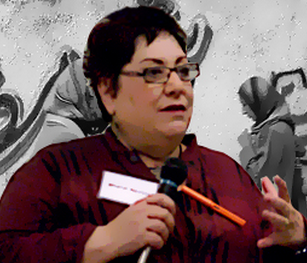At the beginning of the current school year, the student union at Ryerson University invited IJV to have a table during the University’s orientation week. It was a beautiful fall day and the atmosphere was carnival-like, boasting healthy food stands, and organizational tables beckoning students to widen their horizons by engaging with a variety of environmental and social justice advocates. I secured the IJV banner to our table and sat down next to Ronnie Yaron, an IJV member who had volunteered to help out. Within minutes we were facing a small crowd of Jewish students — self-identified members of the campus Hillel — who launched a barrage of questions at us: “Do you support Hamas?” “Didn’t you know that in the recent war in Gaza that Palestinians were used as human shields?” “Isn’t Israel entitled to defend itself against missiles aimed at civilians?” Anyone who followed the postings of the Centre for Israel and Jewish Affairs during the Gaza attacks would immediately recognize that these questions weren’t spontaneously generated but were, rather, plucked practically verbatim from the Israeli “hasbara” (propaganda) playbook.
The Jewish community in Toronto runs regular workshops to prepare Jewish students for what they describe as a hostile and anti-Semitic atmosphere on campus. The students are taught that criticism of Israeli policies, and advocacy of Boycott, Divestment and Sanctions are not valid expressions of political dissent, but rather, pure anti-Semitism. The students we encountered were absolutely convinced that campaigns against Israel’s policies in the occupied territories actually violated their human rights and that they were struggling with none other than the same irrational hatred that Jews had endured for thousands of years.
As a student and later as a university professor, I have always felt strongly that the most important role of the academy is to give students the tools they need to think critically about the many truth claims that they encounter in academia and in everyday life. What disturbed me about the exchange I had with the Hillel students was their absolute faith in a narrative that has been so thoroughly and expertly deconstructed not only by academicians both in Israel and abroad, but by spiritual leaders, public intellectuals and activists who have come to understand this ongoing conflict as one in which Israeli military power, material superiority, and discursive authority work unconstrained to render Palestinians completely powerless to determine their own destiny.
When I asked one Hillel member whether it was morally defensible to bomb UN schools to which besieged Gazans had fled, his answer was “they should have gone somewhere else.” Perhaps he would have them flee by way of the sea, a last-ditch strategy that has been fatal for many Palestinians. I found this student’s lack of compassion and the profound ignorance behind his response very disturbing. That this may well have been fostered through a concerted program aimed at training Jewish university students how to defend Israel is even more distressing. Ironically, one of the claims made by those in the organized Jewish community is that pro-Palestinian organizations on campus prey on unsophisticated students and that “left-wing” professors use the classroom to attack Israel. It seems to me that the only really concerted program of brainwashing is that which is run by Jewish communal institutions which school Hillel members and others in a decidedly one-sided version of the Israel/Palestine conflict.
At the recent gathering in Toronto called “Doing Jewish off the grid: Politics, Identity, Spirituality,” IJV, the United Jewish Peoples Order (UJPO) and an emerging young group called the “Critical Jew Network” came together to — in part — challenge the hasbara industry, which incites Jewish students’ mindless support of an increasingly immoral and criminal Israeli regime. This kind of “education” has no place in institutions of higher learning. One of the most important mandates of IJV is to promote critical perspectives of the conflict based on the ever-growing body of evidence-based academic writing that challenges a discredited Zionist historiographical tradition. This tradition continues to hold sway over mainstream Jewish education and over institutions such as Hillel. There’s a deep hunger among young Jews for a more truthful telling of the Israel-Palestine saga, and one that recognizes the deep injustices that continue to shape Palestinian lives. Young Jews will settle for nothing less than the truth; they should not have to.
Sheryl Nestel has been an activist for peace and justice in Israel/Palestine for over 40 years in Canada, the U.S. and in Israel/Palestine where she lived between 1974 and 1988. She is on the national steering committee of Independent Jewish Voices – Canada.
Editor’s note: An earlier version of this article mistakenly referred to the Ryerson Student Union (RSU) as “student government.” The RSU is a union, not an executive body.



